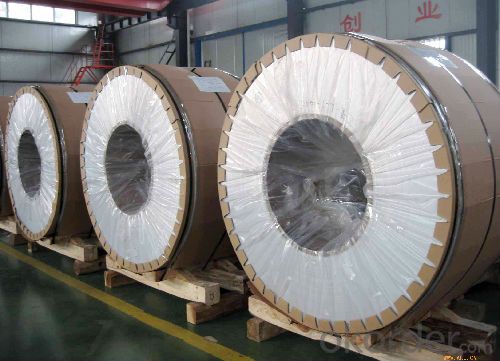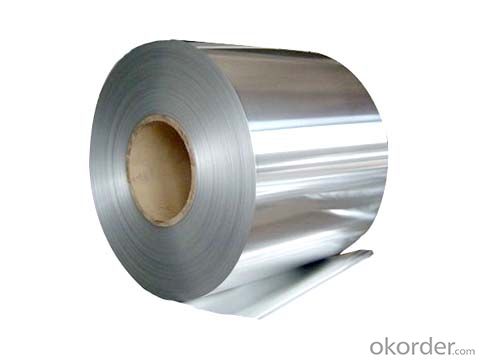AA8079 aluminium coil
- Loading Port:
- China Main Port
- Payment Terms:
- TT or LC
- Min Order Qty:
- -
- Supply Capability:
- -
OKorder Service Pledge
OKorder Financial Service
You Might Also Like
1、 Structure of Aluminium Coil Description
Disposable aluminum Coil air food boxes is able to endure high low temperature (20-250) molecular structure stability don't change packing materials. Compared with the current widespread use of plastic snack box can only carry temperature range is - 16 to 85, it can take food from refrigerator to oven to table, and do not need to change container.
2、Main Features of the Aluminium Coil
Alloy: | A1100, A3003, A3004, A5005, A8011 etc. |
Temper | H14, H16, H18, H24 etc. |
Thickness | From 0.024mm to 1.2mm |
Width | From 56mm to 1600mm |
Color | Customized, you can choose from our color chart, or we adjust the special color as the samples you offer. |
Coating | PE coating, PVDF coating, Back coating |
Coating thickness: | 0.18mm for PE coating, 0.25mm for PVDF coating |
3、 Aluminium Coil Images


4、Aluminium Coil Specification
Alloy: | A1100, A3003, A3004, A5005, A8011 etc. |
Temper | H14, H16, H18, H24 etc. |
Thickness | From 0.024mm to 1.2mm |
Width | From 56mm to 1600mm |
Color | Customized, you can choose from our color chart, or we adjust the special color as the samples you offer. |
Coating | PE coating, PVDF coating, Back coating |
Coating thickness: | 0.18mm for PE coating, 0.25mm for PVDF coating |
5、FAQ of Aluminium Coil
a. What is monthly capacity
---CNBM is one stated own company and our monthly capacity is about 2000tons.
b. Now which countries do you export your goods?
----Now we export to South East Asia,Africa, North America,South America ect.
- Q:What are the potential applications of coil-annealed aluminum coils?
- Coil-annealed aluminum coils have a wide range of potential applications due to their unique properties. They can be used in manufacturing various products such as automotive parts, electronic components, packaging materials, construction materials, and even in the aerospace industry. The annealing process enhances the coil's flexibility, strength, and corrosion resistance, making it ideal for applications where durability, formability, and lightweight characteristics are crucial.
- Q:Can aluminum coils be used for structural purposes?
- No, aluminum coils are typically not used for structural purposes as they lack the necessary strength and rigidity required for structural applications.
- Q:Are aluminum coils resistant to UV radiation?
- Yes, aluminum coils are generally resistant to UV radiation. Aluminum has a natural oxide layer that provides protection against UV rays, making it highly durable and suitable for outdoor applications.
- Q:Can aluminum coils be used for decorative purposes?
- Aluminum coils offer a multitude of possibilities when it comes to decoration. This versatile material can be easily molded and adjusted, making it ideal for a wide range of decorative uses. In industries like architecture, interior design, and automotive design, aluminum coils are frequently employed to create decorative trims, accents, and borders. To further enhance their visual appeal and match the desired aesthetic, these coils can be painted or coated with different finishes. Moreover, thanks to their lightweight nature and durability, aluminum coils are a popular choice for outdoor decorative purposes, such as garden ornaments, sculptures, and signage. Ultimately, incorporating aluminum coils into various projects provides a cost-effective and visually pleasing solution for adding decorative elements.
- Q:What are the factors that determine the price of aluminum coils?
- The factors that determine the price of aluminum coils include the current market demand and supply, the cost of raw materials, production and manufacturing costs, transportation costs, market competition, and any additional factors such as tariffs or taxes.
- Q:What are the thickness tolerances for aluminum coils?
- The specific grade and alloy of aluminum being utilized can cause variations in the thickness tolerances of aluminum coils. Typically, the range for tolerances in coil thickness is between +/- 0.003 and 0.015 inches (0.076 to 0.381 mm). Nevertheless, it is crucial to acknowledge that various industries and applications might possess their own distinct requirements and tolerances. To ascertain the precise thickness tolerances necessary for a particular application, it is advisable to refer to the appropriate industry standards or specifications.
- Q:What are the disadvantages of using aluminum coils?
- Using aluminum coils in various applications has several drawbacks. To begin with, compared to materials like copper, aluminum coils have a lower heat transfer coefficient. This means they are not as effective in transferring heat, which can negatively impact the performance and energy efficiency of cooling or heating systems. Moreover, aluminum coils are more susceptible to corrosion compared to copper coils. This is particularly true in environments with high humidity or exposure to harsh chemicals. Corrosion can result in leaks in the coil, reducing its lifespan and potentially causing damage to the system. Another disadvantage of aluminum coils is their relatively lower tensile strength compared to other materials. This makes them more vulnerable to damage or failure under excessive pressure or stress. This can be a concern in applications where the coils are subject to high pressure or frequent movement. Additionally, aluminum coils can be more costly compared to materials like copper. Although aluminum itself is cheaper, the manufacturing processes involved in producing aluminum coils and the additional coatings required to enhance its performance can increase the overall cost. Lastly, aluminum coils may require more maintenance and cleaning compared to other materials. Due to their tendency to accumulate dust, dirt, and debris more easily, regular cleaning is necessary to maintain their performance and prevent clogging or blockages. Overall, while aluminum coils have advantages such as being lightweight and resistant to corrosion in certain environments, it is important to consider these disadvantages when selecting the appropriate coil material for specific applications.
- Q:What is the difference between aluminum coils and aluminum sheets?
- Aluminum coils and aluminum sheets share the same material, aluminum, but they have distinct characteristics. Firstly, their form and shape differ significantly. Aluminum coils are elongated and wound into a coil shape. They find wide application in construction, automotive, and HVAC industries for purposes such as roofing, insulation, and air conditioning systems. In contrast, aluminum sheets are flat and come in various sizes and thicknesses. They are commonly utilized in aerospace, transportation, and packaging industries for aircraft parts, automotive body panels, and food packaging. Additionally, their manufacturing processes are distinct. Aluminum coils are produced using continuous casting, where molten aluminum is poured into a mold and cooled to solidify into a coil. This technique allows for the creation of long, continuous coils. Conversely, aluminum sheets are typically manufactured through a rolling process. The aluminum is passed through a series of rollers that gradually reduce its thickness until the desired sheet thickness is achieved. Consequently, this method enables the production of flat sheets with specific thicknesses. Furthermore, the applications of aluminum coils and sheets also differ. Due to their coil shape, aluminum coils are suitable for applications that require long, continuous lengths like roofing or HVAC systems. On the other hand, the flat shape of aluminum sheets makes them ideal for applications that necessitate a flat surface, such as panel or component manufacturing. To summarize, the main distinctions between aluminum coils and aluminum sheets lie in their form, manufacturing process, and applications. Coils are elongated pieces created through continuous casting, while sheets are flat pieces produced through rolling. The choice between coils and sheets depends on the specific requirements of the application at hand.
- Q:Can aluminum coils be used for industrial piping?
- Yes, aluminum coils can be used for industrial piping. Aluminum is a lightweight and corrosion-resistant material, making it suitable for various industrial applications, including piping systems.
- Q:Are there any limitations to using aluminum coils?
- Yes, there are several limitations to using aluminum coils. Firstly, aluminum coils are more expensive compared to other coil materials such as copper. This can be a limiting factor for individuals or businesses with budget constraints. Secondly, aluminum coils have lower thermal conductivity than copper coils. This means that they are less efficient at transferring heat, which can result in decreased performance in some applications. Additionally, aluminum is more susceptible to corrosion and oxidation compared to other materials. This can be a limitation in environments that are highly corrosive, such as coastal areas or industrial settings. Furthermore, aluminum coils are generally not suitable for high-pressure applications. They are more prone to leaks or failures under high pressure, which can limit their use in certain HVAC systems or refrigeration units. Lastly, aluminum coils are not as malleable as copper coils, making them more difficult to work with during installation or repair. This can lead to increased labor costs or potential damage to the coils during handling. Overall, while aluminum coils have their advantages such as being lightweight and environmentally friendly, they also have limitations that need to be considered based on the specific application and requirements.
1. Manufacturer Overview |
|
|---|---|
| Location | |
| Year Established | |
| Annual Output Value | |
| Main Markets | |
| Company Certifications | |
2. Manufacturer Certificates |
|
|---|---|
| a) Certification Name | |
| Range | |
| Reference | |
| Validity Period | |
3. Manufacturer Capability |
|
|---|---|
| a)Trade Capacity | |
| Nearest Port | |
| Export Percentage | |
| No.of Employees in Trade Department | |
| Language Spoken: | |
| b)Factory Information | |
| Factory Size: | |
| No. of Production Lines | |
| Contract Manufacturing | |
| Product Price Range | |
Send your message to us
AA8079 aluminium coil
- Loading Port:
- China Main Port
- Payment Terms:
- TT or LC
- Min Order Qty:
- -
- Supply Capability:
- -
OKorder Service Pledge
OKorder Financial Service
Similar products
New products
Hot products
Related keywords


























